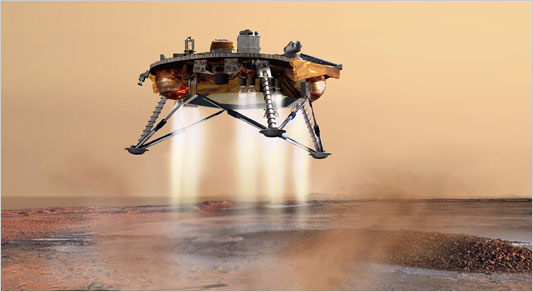onedomino
SCE to AUX
- Sep 14, 2004
- 2,677
- 483
- 98
The two US robots traversing Mars, Spirit and Opportunity, will be joined by Phoenix, Sunday, 4:53PM Pacific:

http://graphics8.nytimes.com/images/2008/05/20/science/mars533.jpg

http://graphics8.nytimes.com/images/2008/05/20/science/mars533.jpg
US Probe to Make Perilous Landing on Martian Arctic
complete article: http://www.physorg.com/news130861701.html
After traveling 679 million kilometers (422 million miles) through the cosmos, on Sunday the probe will have that amount of time to decelerate from 21,000 kilometers per hour (13,000 miles per hour) to a mere float to manage a safe touchdown on the Red Planet's arctic region.
With the nearly five decades of Mars exploration fraught with failures -- about half of the three-dozen tries has crashed, disappeared or missed the planet altogether -- there is little room for error.
"This is not a trip to grandma's house. Putting a spacecraft safely on Mars is hard and risky," said Ed Weiler, associate administrator for NASA's Science Mission Directorate.
Given the long distance, the US space agency's Jet Propulsion Laboratory (JPL) in Pasadena, California, which controls the mission, will have to wait an agonizing 15 minutes for the radio signal confirming the safe landing to reach Earth.
NASA's 420-million-dollar probe will become the first spacecraft to land on the Martian arctic surface, digging into the polar ice in a new three-month mission searching for signs of life on Mars .
Phoenix will enter the top of the Martian atmosphere at around 2331 GMT, use a thermal shield to slow its entry into the atmosphere and then deploy a parachute to reduce its speed.
It will then fire up its thrusters to slow to eight kph (five mph) and land on its three legs on the circumpolar region known as Vastitas Borealis -- akin to northern Canada in Earth's latitude.
"I'm sure as Sunday gets nearer, we'll start to get more and more nervous. We all understand that landing safely on Mars is one of the most challenging parts of our mission," Phoenix Project Scientist Leslie Tamppari said Thursday.
"We do believe that it's a risk worth taking," said Fuk Li, manager of NASA's Mars Exploration program, "because I think that the science the mission will return with will be outstanding and we will open up a new chapter on how we understand Mars to be."
One minute after Phoenix confirms arrival, its radio will go silent for 20 minutes to save its batteries before deploying its two solar antennas.
The first images from Phoenix will reach Earth two hours later.





